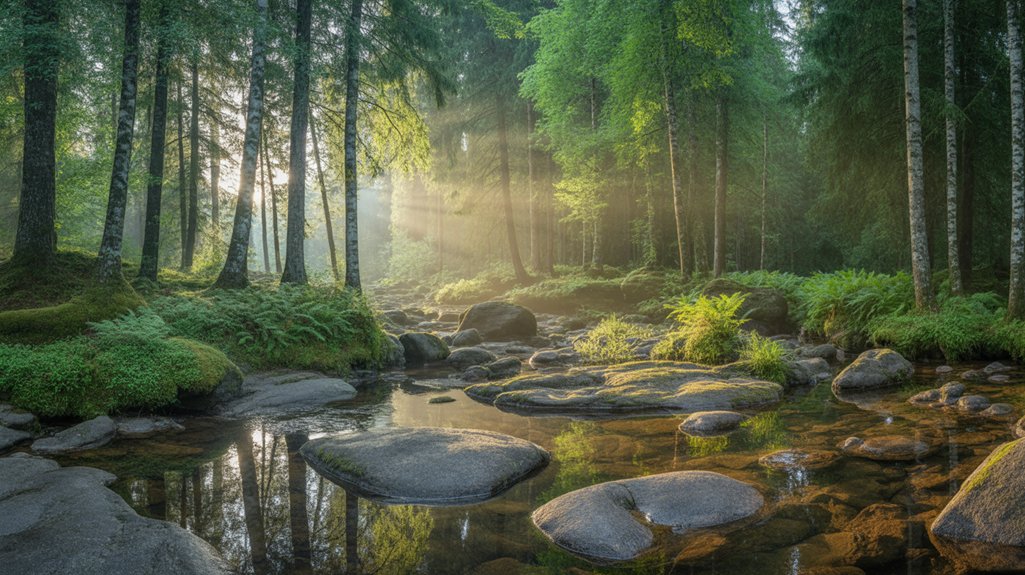You’re probably searching for that perfect summer escape where you can actually breathe deeply without worrying about air quality. Yichun’s transformation from an obscure northeastern Chinese city into a wellness destination wasn’t accidental—it’s built on measurable environmental advantages that health-conscious travelers can’t ignore. The numbers behind Yichun’s air quality tell a compelling story about why your lungs will thank you for making this journey.
The Geography Behind Yichun’s Natural Cooling System

Several key geographical features work together to create Yichun’s remarkably cool summer climate. You’ll find this city positioned at 47°N latitude in Heilongjiang Province, where northern positioning naturally moderates temperatures.
The Greater Khingan Mountains surrounding Yichun act as massive air conditioners, channeling cool winds through the valleys while blocking warm southern currents.
You’re experiencing the benefits of dense boreal forests that cover 84% of the region. These vast woodlands create their own microclimate through evapotranspiration, where millions of trees release water vapor that cools the air naturally.
The forest canopy blocks direct sunlight while maintaining humidity levels that feel refreshing rather than oppressive.
Yichun’s elevation of 400-700 meters above sea level provides additional cooling, dropping temperatures by approximately 4°C compared to lower elevations.
Air Quality Measurements That Put Yichun on the Map
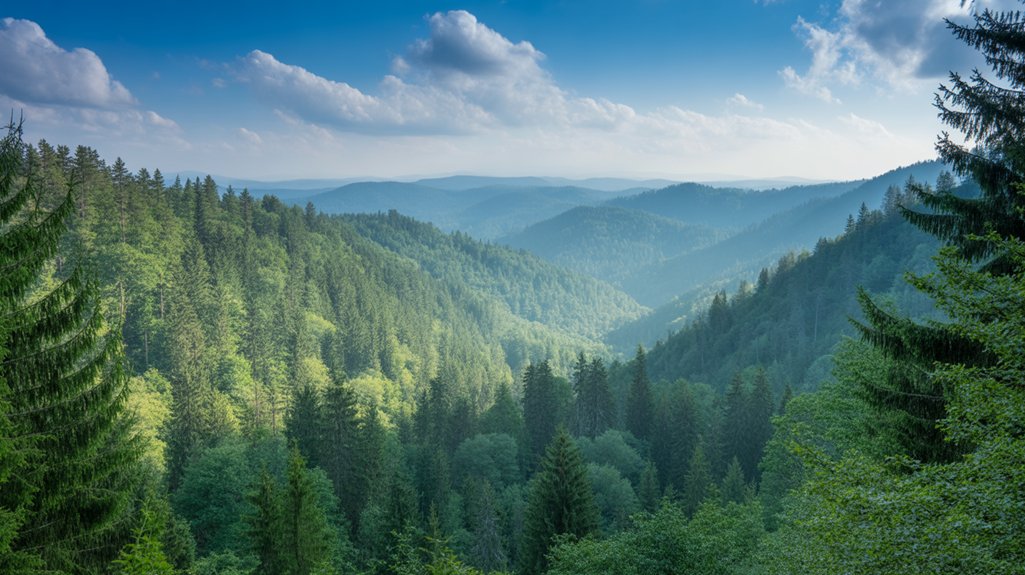
Beyond creating natural air conditioning, Yichun’s forests generate exceptional air quality that’s earned international recognition.
You’ll find negative oxygen ion concentrations reaching 50,000 per cubic centimeter in some forest areas—levels that rival pristine mountain environments worldwide.
The city’s air quality index consistently ranks among China’s top performers, with PM2.5 readings often below 10 micrograms per cubic meter during summer months.
These measurements aren’t just numbers—they’ve attracted scientific attention and wellness tourism.
You can actually feel the difference when you breathe here. The dense forest canopy filters pollutants while releasing fresh oxygen, creating what researchers call a “natural oxygen bar.”
International health organizations have studied Yichun’s air composition, documenting how the forest ecosystem produces measurably cleaner air than most urban environments across Asia.
Ancient Forests and Their Role in Oxygen Production

Towering Korean pines that have stood for centuries form the backbone of Yichun’s oxygen-producing powerhouse.
You’ll discover these ancient giants can live over 400 years, with some specimens reaching heights of 30 meters. Their massive canopies create complex ecosystems that maximize photosynthesis rates throughout daylight hours.
When you walk through these primeval forests, you’re breathing air that’s been purified by millions of needle-covered branches.
Each tree produces approximately 48 pounds of oxygen annually while absorbing carbon dioxide at remarkable rates. The forest’s layered structure – from towering pines to understory shrubs – creates multiple oxygen-generation zones.
You’ll notice the air feels different here because these mature trees produce 260% more oxygen per acre than younger forests, making Yichun’s ancient woodlands exceptional natural air purifiers.
Traditional Chinese Medicine Practices in Forest Settings
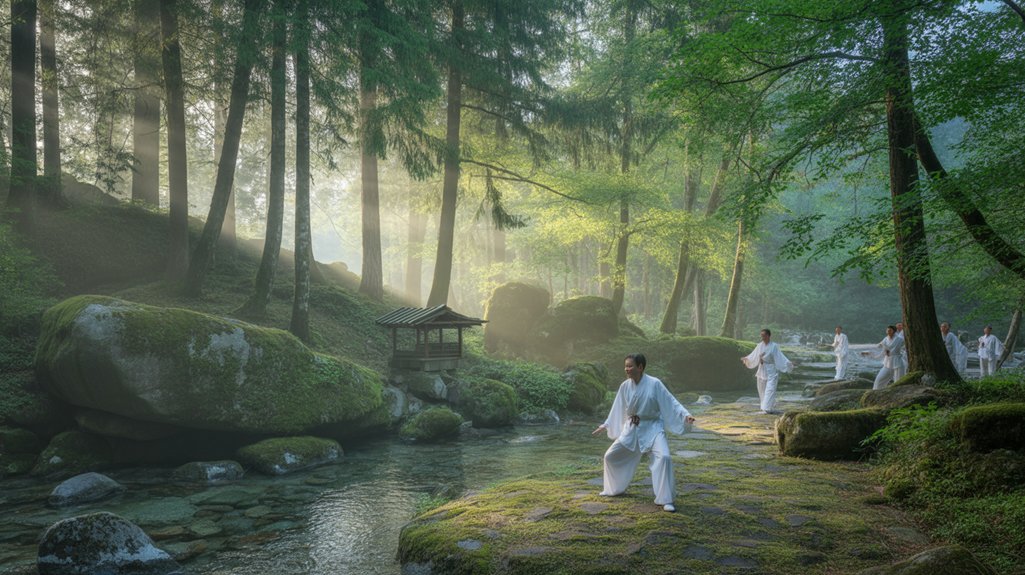
This oxygen-rich environment naturally enhances the therapeutic benefits of traditional Chinese medicine practices that have flourished in Yichun’s forests for over a millennium.
You’ll discover that forest bathing, or “shinrin-yoku,” combines seamlessly with qi cultivation exercises beneath towering pines and ancient spruces. Local practitioners guide you through tai chi sessions where you’ll harness the forest’s natural energy flow while breathing deeply of the pristine air.
You can participate in medicinal herb gathering walks, learning to identify ginseng, schisandra berries, and other healing plants that thrive in these protected woodlands.
Meditation circles incorporate the forest’s natural sounds—rustling leaves, bird songs, and flowing streams—creating an immersive healing experience. These time-honored practices gain amplified potency within Yichun’s exceptionally pure atmosphere.
Modern Eco-Therapy Programs and Wellness Facilities
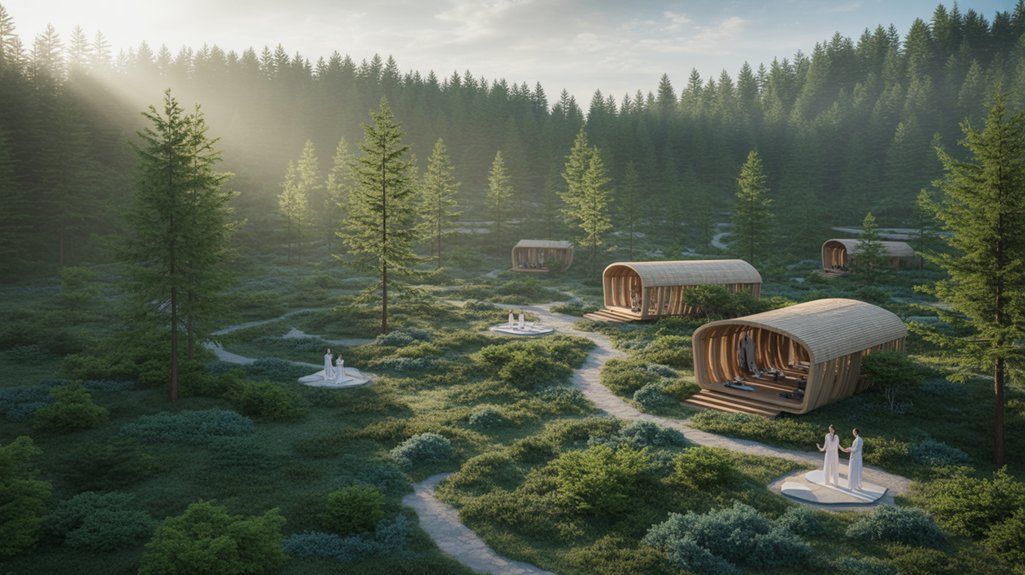
Several cutting-edge wellness centers throughout Yichun have revolutionized traditional forest therapy by integrating scientific research with ancient healing wisdom.
You’ll find specialized facilities offering guided forest bathing sessions backed by biometric monitoring that tracks your stress hormone reduction and immune system improvements.
Modern eco-therapy programs include mindfulness meditation pods positioned strategically among century-old pines, hydrotherapy treatments using mineral-rich spring water, and personalized wellness consultations combining Western psychology with Traditional Chinese Medicine principles.
State-of-the-art wellness resorts feature oxygen-enriched meditation chambers, therapeutic hiking trails with designated breathing stations, and spa treatments incorporating locally harvested herbs and essential oils.
You can participate in group therapy sessions conducted entirely outdoors, aromatherapy walks through designated healing gardens, and digital detox programs designed to reconnect you with nature’s restorative powers while monitoring your physiological responses.
Seasonal Temperature Comparisons With Major Chinese Cities
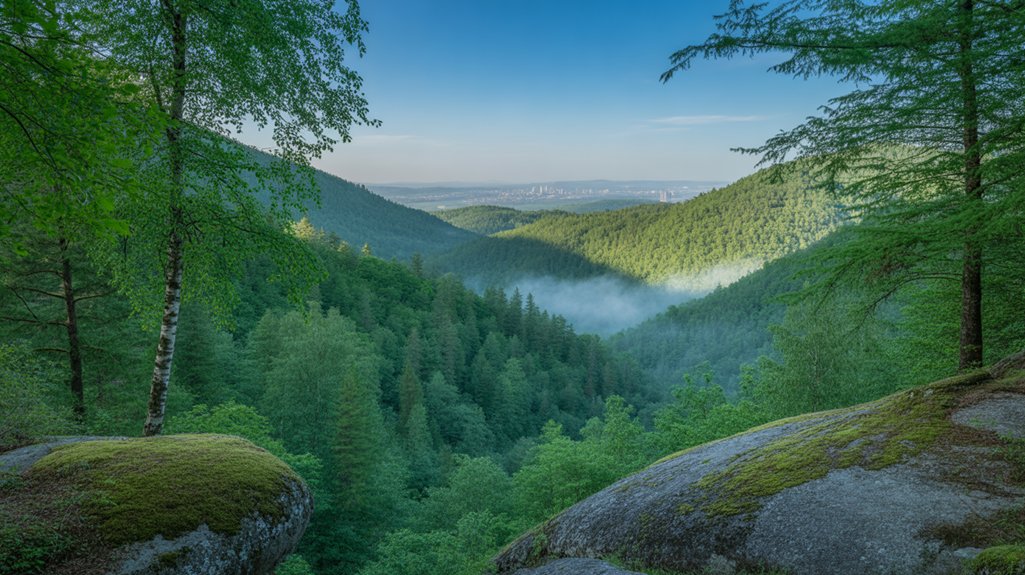
While many Chinese cities swelter under oppressive summer heat, Yichun’s temperatures remain remarkably moderate, making it an ideal escape from the urban furnace.
You’ll find Yichun’s July averages hover around 22°C (72°F), while Beijing reaches 27°C (81°F) and Shanghai climbs to 28°C (82°F). If you’re fleeing Guangzhou’s stifling 29°C (84°F) or Chongqing’s brutal 30°C (86°F), you’ll appreciate Yichun’s refreshing coolness.
The city’s northern latitude and dense forest coverage create natural air conditioning that you won’t experience in concrete jungles. During peak summer months, you can enjoy comfortable days without the energy-draining humidity that plagues southern metropolises.
This temperature differential makes Yichun your perfect sanctuary for escaping China’s summer heat.
Wildlife Conservation Efforts Supporting Tourism Development
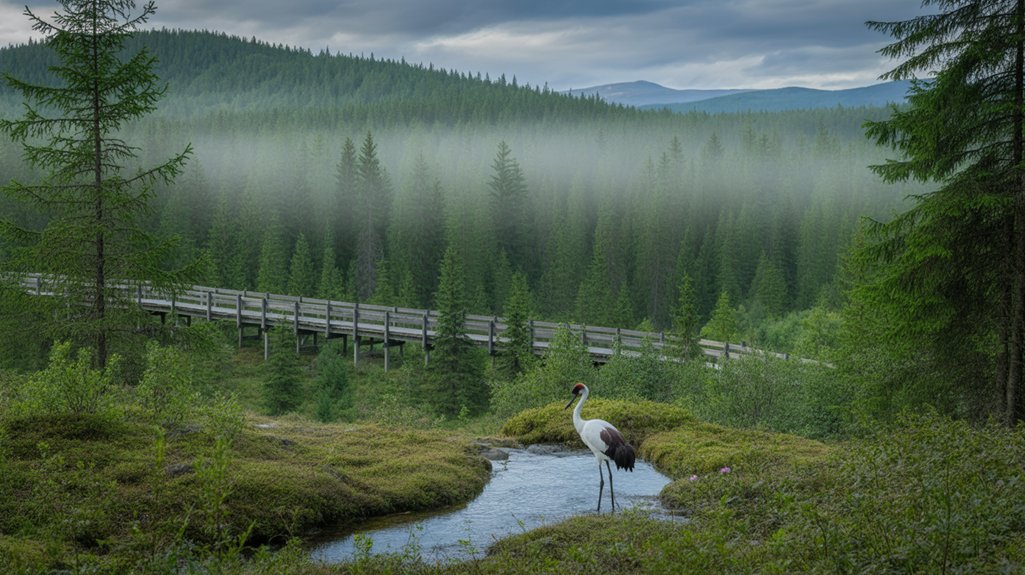
Yichun’s cool climate doesn’t just attract human visitors—it’s created a thriving ecosystem that supports some of China’s most impressive conservation success stories.
You’ll discover that the region’s wildlife preservation programs directly enhance your eco-tourism experience. The Siberian tiger population has increased through protected corridor initiatives, and you can visit specialized viewing areas that generate revenue for continued conservation.
You’ll find that red-crowned crane sanctuaries offer guided tours, with proceeds funding habitat restoration. The region’s lynx and brown bear monitoring programs include visitor education centers that showcase conservation technology.
These wildlife protection efforts create authentic nature experiences while ensuring sustainable tourism that doesn’t compromise the ecosystem you’ve come to enjoy.
Accommodation Options for Extended Wellness Stays
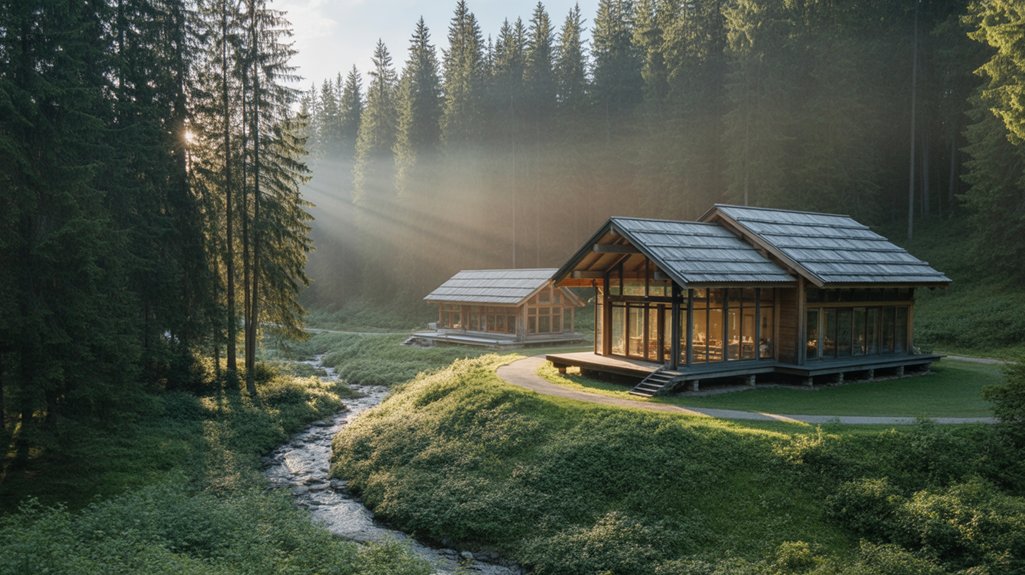
Beyond traditional hotels, you’ll find that Yichun’s accommodation landscape caters specifically to visitors seeking month-long wellness retreats and therapeutic stays.
Forest lodges offer private cabins equipped with air purification systems and meditation spaces, while wellness resorts provide dedicated healing suites with herbal steam rooms and oxygen therapy facilities.
You can book extended-stay packages at eco-villages that feature organic gardens, allowing you to participate in therapeutic farming activities.
Mountain retreats offer dormitory-style accommodations with shared wellness amenities, making long-term stays affordable.
Many facilities include on-site naturopathic practitioners, yoga instructors, and traditional Chinese medicine specialists.
These accommodations typically offer weekly and monthly rates, meal plans featuring locally-sourced ingredients, and flexible scheduling that adapts to your healing journey rather than rigid check-in requirements.
Activities and Experiences Beyond Forest Bathing

Once you’ve settled into your chosen accommodation, Yichun reveals a rich tapestry of wellness activities that complement the renowned forest bathing experience.
You’ll discover guided meditation sessions in ancient pine groves, where centuries-old trees create natural sound barriers that enhance your mindfulness practice. Local thermal springs offer therapeutic soaks that rejuvenate tired muscles while you breathe the crisp mountain air.
Traditional Chinese wellness practices flourish here through tai chi classes at dawn and qigong sessions overlooking pristine valleys.
You can participate in herbal workshops where you’ll learn to identify medicinal plants native to the region. Night sky observation sessions take advantage of minimal light pollution, allowing you to connect with nature’s rhythms.
These diverse experiences create a comprehensive wellness journey that extends far beyond simple forest immersion.
Transportation and Accessibility From Urban Centers

While Yichun’s pristine forests may seem remote, you’ll find multiple convenient transportation options connecting this wellness destination to major Chinese cities.
You can fly directly into Yichun Lindu Airport from Beijing, Shanghai, and Harbin, with flight times ranging from 1.5 to 2.5 hours.
If you prefer ground travel, high-speed rail connects Yichun to Harbin in just three hours, with onward connections to Beijing and other major hubs. Regular bus services also operate from neighboring cities like Harbin and Mudanjiang.
Once you arrive, local shuttles and taxi services provide easy access to forest parks and wellness resorts. The city’s compact size means you’re never more than 30 minutes from nature trails and oxygen-rich environments.
Conclusion
You’ll discover that Yichun isn’t just another destination—it’s your gateway to authentic wellness tourism. You’re stepping into a region where ancient forests meet modern eco-therapy, creating an unmatched retreat experience. Whether you’re seeking forest bathing, traditional healing practices, or simply clean air to breathe, you’ll find Yichun offers everything needed for genuine rejuvenation. It’s where your wellness journey truly begins in Northeast China’s natural sanctuary.
